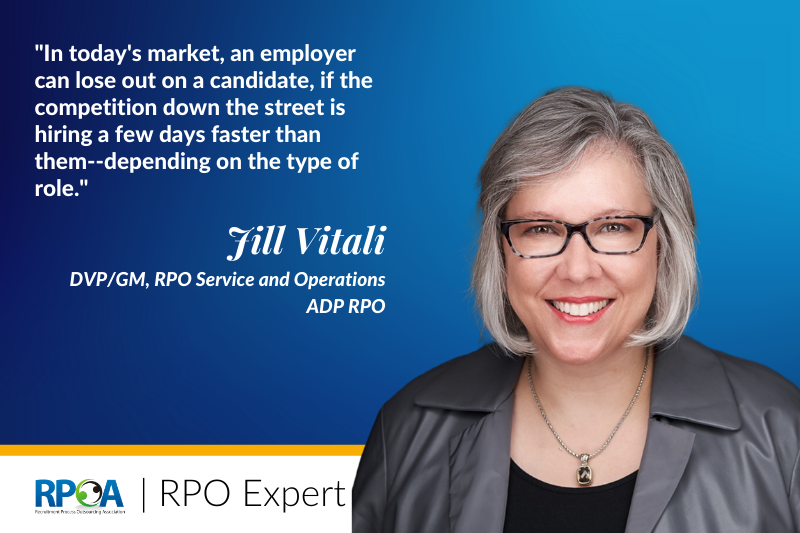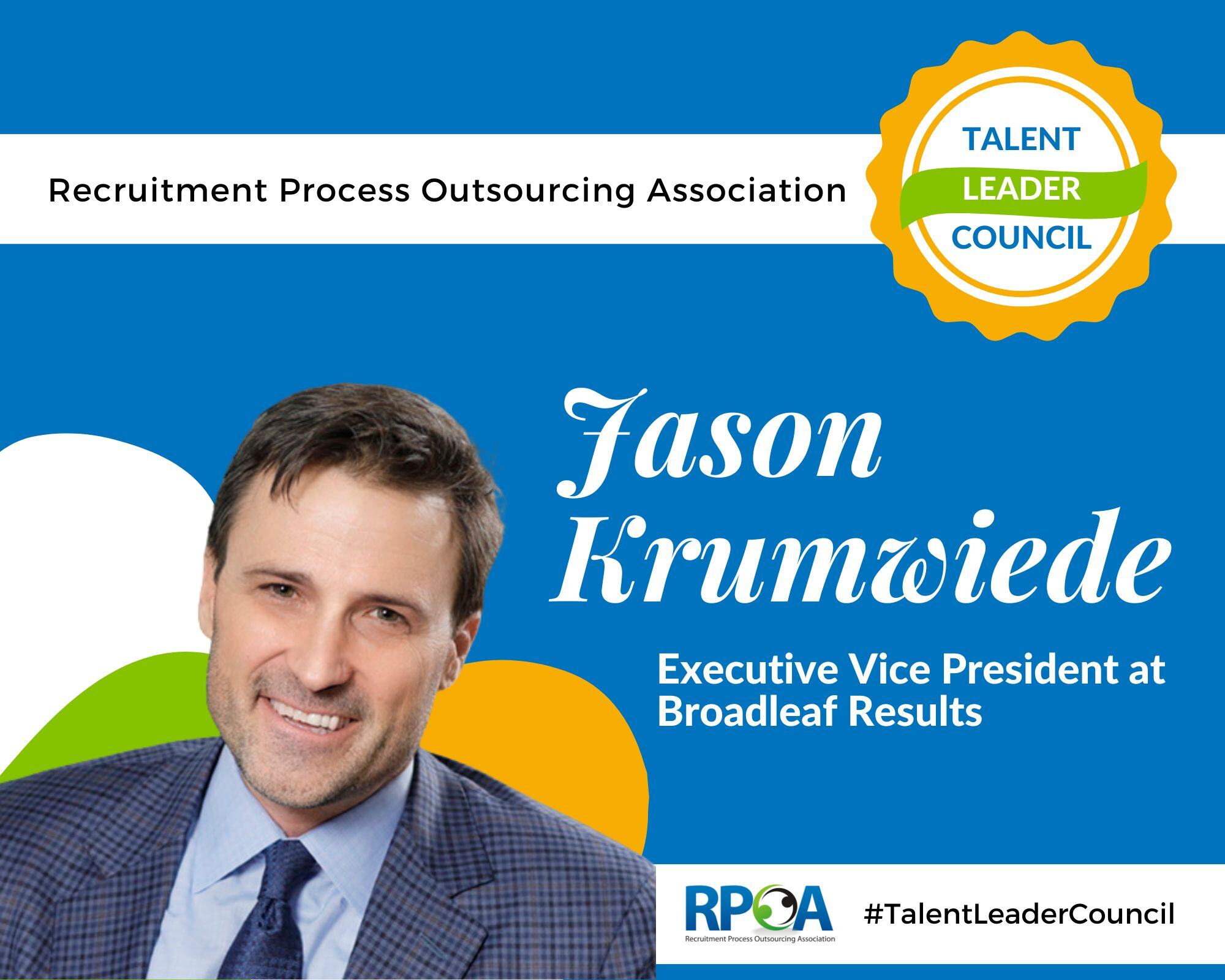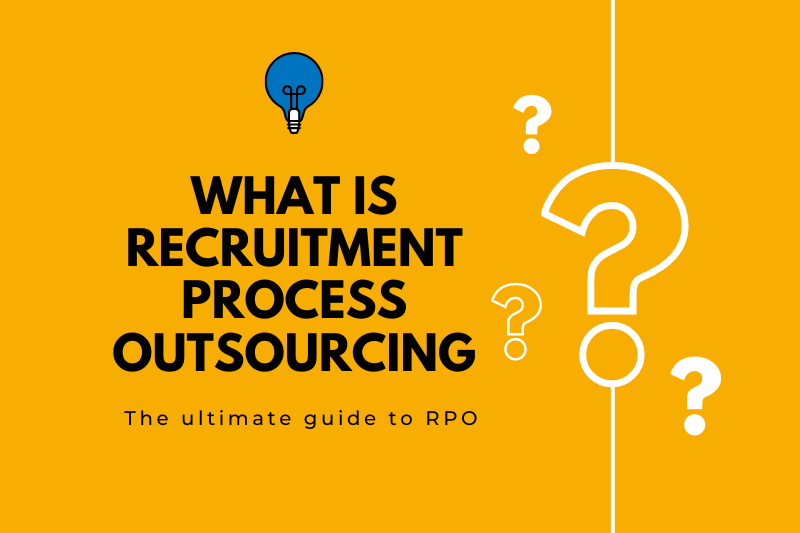
Recruitment Process Outsourcing (RPO) offers a practical and effective solution for employers seeking to improve hiring performance and align hiring with business strategy. But what exactly is RPO? Why should employers consider outsourcing their recruiting to an external provider? This article answers those two questions and explains the types of RPO engagements, their costs and benefits, and how to find and select the right RPO company. Understanding RPO can give an organization a competitive edge in today's unpredictable talent market, from start-ups to large corporations. We hope this article helps you understand recruitment process outsourcing and its role in today's talent acquisition landscape.
In this article, you’ll find:- What is recruitment process outsourcing (RPO)?
- Why consider outsourcing your recruitment?
- Types of RPO Engagements
- How much does RPO cost?
- Making the case for RPO
- How to make the case for outsourced recruitment
- Resources for finding RPO companies
- Factors in selecting the right RPO provider
What is Recruitment Process Outsourcing (RPO)?
Recruitment process outsourcing (RPO) is a form of business process outsourcing (BPO) where an employer transfers all or part of its recruitment processes to an external service provider, according to the Recruitment Process Outsourcing Association (RPOA). An RPO provider can provide its own or may assume the company’s staff, technology, methodologies, and reporting. In all cases, RPO differs greatly from providers such as staffing companies and contingent/ retained search providers in that it assumes ownership of the design and management of the recruitment process and the responsibility for results.
Why Consider Outsourcing Your Recruitment?
Recruitment process outsourcing provides employers with numerous hiring benefits. The 2022 RPO Value and Insights Study revealed the benefits of partnering with an RPO provider. The data showed employers that use talent solutions from an RPO provider experienced:
- 96 percent improved hiring metrics
- 58 percent increased time to hire
- 51 percent increased hiring consistency
- 43 percent generated higher quality hires, and
- 42 percent reduced the cost of hiring.
When an organization transfers all or some of its recruitment process to an outside talent solutions partner, it gains expertise backed by decades of experience forging successful recruitment programs. As recruitment experts, talent acquisition constitutes the core competency of RPO providers. They bring people, technologies, and processes together to attract and acquire top talent based on the client’s needs. In addition, outsourcing recruitment to an external provider allows employers to scale their hiring function up or down to meet fluctuations in hiring demands. As a result, RPO providers create fruit-bearing partnerships with employers.
Of the 519 talent acquisition decision-makers surveyed in the proprietary RPO research produced by the RPOA and Lighthouse Research and Advisory (LHRA), less than 20 percent believed they could quickly scale up their talent acquisition (TA) team headcount if they had a reduction in force. Eighty percent said they would need longer than a month to ramp up their talent acquisition team. However, the study showed that employers working with an RPO said they could instantly scale up their talent acquisition function.
Types of RPO Engagements
Depending on the hiring scope and delivery, different engagement models exist for partnering with RPO providers. RPO consultant, serial entrepreneur, and RPOA Advisory Board Member Kim Davis describes the following engagement types.
Enterprise Full Talent Lifecycle RPO:
In a full talent lifecycle, the employer uses one or more RPO providers to hire for all skill sets, business units, and locations. The RPO replaces internal recruitment resources, providing candidates and hiring managers with a seamless experience from start to finish. The RPO provider staff can work onsite, virtually, at a recruitment center, or a combination of these options. Employers also have the flexibility to transfer their staff to the RPO provider if needed. This model includes fully configured talent technology and detailed reporting with benchmarking capabilities. It has a structured implementation and launch process, typically taking 8 to 12 weeks.
Hybrid-Select Process/Staff Augmentation RPO:
In this engagement type, RPO providers augment the internal employer recruitment resources for specific open jobs, specific business units, or specific locations, and/or for specific recruitment processes. The RPO delivery staff is virtual and/or at the provider recruitment center. The RPO provider typically configures or optimizes the client’s technology (ATS/CRM), measurements, and reporting. A structured implantation launch takes 4 to 8 weeks.
On-Demand/Project RPO:
This type of engagement is typically for a defined number of openings, a designated location, and a defined timeline. The delivery staff can be virtual or at a provider recruitment center. The RPO uses the clients’ TA technology, provides measurements and reports, and can turn solutions on and off. This engagement is sometimes used as a pilot and has a less formal “Quick Start” of two weeks. Most major RPO providers do not offer project RPO, while small and midsize providers use it as an entry point for longer-term RPO engagements.
Contingent RPO Model:
This is a relatively newer RPO engagement type driven by the expanding gig economy. Under this model, RPO companies provide direct sourcing for temp and contract labor hires. It can be offered with a permanent placement RPO solution or independently. Historically speaking, this type of engagement emerged in the EMEA region (Europe, Middle East, and Asia) and has since gained momentum in North America.
Historically, enterprise RPO engagements constituted more than half of the RPO deals in the marketplace, according to Everest Group 2023 State of Global Recruitment Process Outsourcing report. In 2022-2023, more than 60 percent of new RPO deals were project engagements as the RPO market experienced a temporary slowdown. Everest Group analysts attribute the popularity of flexible RPO models to the “shorter commitments and still evolving RPO adoption.”
Practice Director Lokesh Goyal at Everest Group describes data highlighting the value small- and mid-size firms find testing out RPO with Project RPO.
How Much Does RPO Cost?
There isn't a flat industry-based fee for specific RPO solutions or a price range for small businesses or large enterprises. The cost of an RPO solution depends on the RPO provider and the employer’s specific needs. However, a few pricing models for RPO engagements balance risk and benefit.
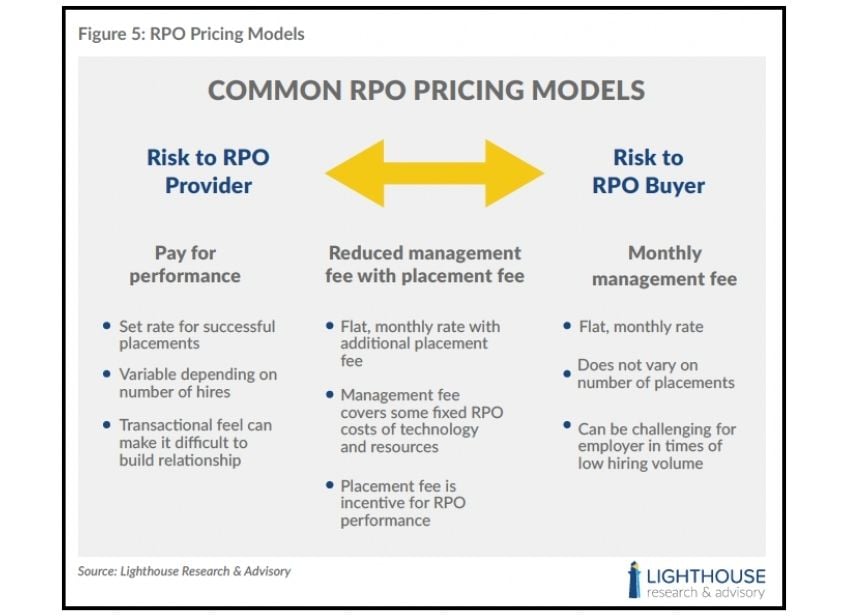
The most common RPO cost models, according to Kim Davis, include:
Management Fee Pricing Model:
Under this cost model, the RPO provider charges a monthly or hourly fee. The fee covers staff costs, technology, sourcing, account management, overhead, and other expenses. This model is also known as a fixed-fee model. The fixed-fee model is easier to budget but is difficult to scale. Under this pricing, the RPO provider takes less risk than other models.
Pay For Performance Pricing Model:
This flexible pricing model is easier to scale and allows recruitment expenses to align with the employer’s hiring needs. Under this model, RPO providers take the majority of risk and are highly vested in a successful recruitment program. The RPO provider will typically charge an open fee for each open job requisition and a close once the job is filled.
Hybrid-Blended Pricing Model:
This pricing model combines the monthly management fee and pay-for-performance models. While this model lowers the RPO provider’s risk, talent solutions are more scalable under this model than a fixed fee model. The preferred type of Hybrid-Blended model is a True Up Pricing Model. A True Up Model adjusts transactional open and close fees to one minimum monthly fee. The minimum monthly fee is usually one payment of the higher fee between open and close fees.
Making The Case For RPO
Employers that outsource their recruitment to an RPO partner report measurable value from their investment. According to the 2023 RPO Value and Insights Study produced by LHRA in partnership with the RPOA, cost is the top reason employers say they don’t use RPO, followed by their fear of losing control. However, the study shows that the value gained from a successful RPO greatly outweighed its cost and perceived risks. “Talent executives in our study were overwhelmingly positive in their estimations of the value brought on by their partnerships with trusted RPO providers,” says Ben Eubanks, Chief Analyst at LHRA. “The benefits ranged from recruiting-specific outcomes like time to fill and consistency to business-impacting outcomes like return on investment.”
How does RPO positively affect a company's return on investment? According to the same study, employers with a positive return on their RPO investment see improvements in hiring metrics, such as consistency, quality, and overall success. The data from this study shows that employers using RPO are:
1) 88 percent more likely to be using full talent lifecycle for all roles, not just for some skills or roles.
2) More likely to have had the RPO relationship in place for a longer period of time, indicating that positive ROI isn’t an overnight occurrence.
3) 80 percent more likely to say hiring is consistent/predictable.
4) 2x more likely to say hires are higher quality.
5) 2x more likely to say RPO partnership has improved hiring metrics overall.
Eubanks commented that "those with a positive ROI expect their RPO partners to offer support for virtually every type of service outlined [in the figure below], but they also end up being more satisfied in the end (31 percent more likely to be satisfied with the partnership compared to firms with neutral/negative ROI)."
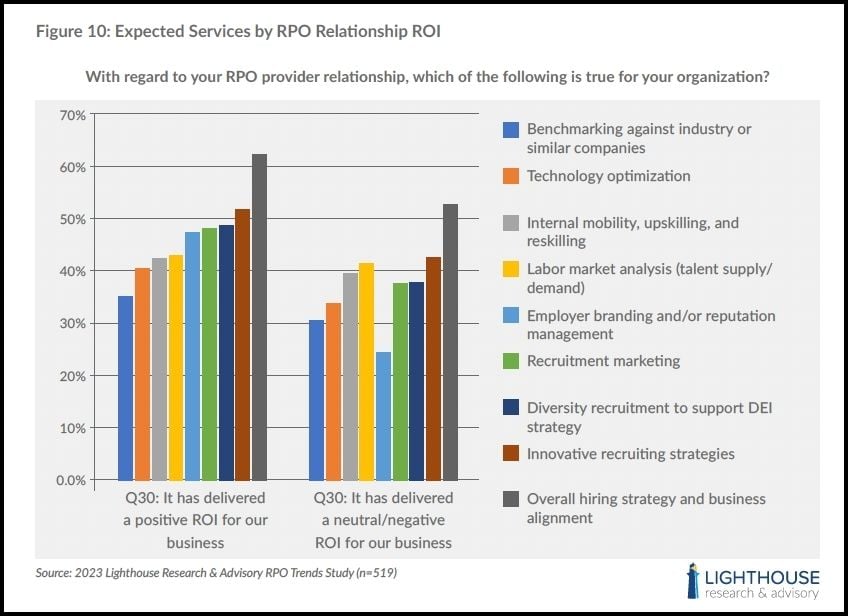
What is the effect of RPO on business revenue? The 2023 RPO Trends Report shows a strong correlation between employers working with an RPO company and increased revenue. Employers working with an RPO company were twice as likely to increase revenue than employers not working with one.
Furthermore, the report noted that 97 percent of talent leaders say that partnering with an RPO provider frees them up to concentrate on vital activities that grow the business. Also, 90 percent of companies said that an RPO partner helps them create clearer communication and gain clarity on how hiring affects key business metrics and KPIs.
Finding RPO Companies
The most common approaches for employers to find the best RPO companies are through:
- Referrals
- Industry lists such as the HRO Today’s Bakers Dozen, Everest Group’s PEAK Matrix, and ClearlyRated’s Best of RPO Companies
- Search engines
- RPO consultants
The Recruitment Process Outsourcing Association (RPOA) offers the iCoCo Marketplace, a searchable innovative tool specifically for the RPO market. It allows you to research RPO companies, consultants, service and technology providers based on recruitment services, engagement types, technology categories, global hiring capabilities, and overall hiring strategy and business alignment.
Suggested Resource:
Find the right RPO company for your organization at the iCoCo Marketplace
Selecting the Right RPO Provider
RPO providers vary in their services, how they engage with clients, their technologies, market intelligence capabilities, and the areas they serve. Let's look closely at some factors when choosing an RPO partner.
Recruiting Services:
Modern RPO companies have evolved their recruiting services to meet today’s hiring challenges. They offer various innovative talent solutions, including recruitment marketing services, diversity recruitment, and internal mobility support. Before considering a job offer, today’s job-seekers want to know about an organization's culture and work environment. RPO recruitment marketing services help quality candidates see the value of a company’s culture and work environment.
Talent Technology and Market Intelligence:
RPO companies have the expertise and tools to enhance your tech stack. They can optimize your existing technology or introduce new solutions. Our analyst partner, Everest Group, discovered that RPO providers focus on solutions like skill gap analysis, industry benchmarks, and compensation info.
Global Hiring:
Global RPO firms can expand employers’ talent search globally, ensuring local compliance and offering decades of experience and insights into global talent acquisition. They help create robust global talent communities by prepping for future skill gaps. Global RPOs also provide flexible scalability, meet global talent supply and demand, and offer best-in-class recruiter training and development.
Practice Director at Everest Group Lokesh Goyal highlights the increased demand for global strategic talent acquisition services,
Overall Hiring Strategy and Business Alignment:
Original RPO research developed by RPOA in partnership with LHRA in 2023 discovered that as RPO relationships progress, they transform into strategic partnerships. These providers become trusted advisors, assisting clients in aligning their business and hiring goals. This finding supports additional research from the Everest Group, which found a global increase in demand for strategic talent acquisition services, with North America taking the lead.
Conclusion
Recruitment Process Outsourcing offers numerous benefits to employers looking to solve modern hiring challenges. RPO providers bring recruitment competency, industry expertise, and technology solutions to their partners. RPO engagement types and pricing models can be tailored to meet different needs and budgets. Employers that use RPO experience tangible improvement in their hiring metrics and increase in revenue, making RPO a highly desirable option for organizations of all sizes. Employers apply different criteria in selecting an RPO provider and use various avenues for finding RPO companies.
The article was first published on February 12, 2013, and last revised on February 6, 2024.RPO Toolbox
- The RPO Academy - Free premium content to expand your knowledge about recruitment process outsourcing, talent acquisition and recruiting trends and best practices.
- The RPO Voice - A blog focused on RPO trends and best practices for talent leaders by talent leaders.
- The RPO Market Report - The blog for news and updates from the RPO marketplace.
- iCoCo Marketplace - Find and connect with trusted RPO providers, technology vendors, consultants and service providers serving the RPO marketplace.






